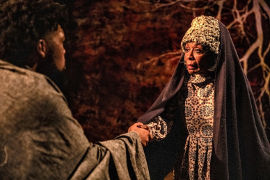
Eric
Uhlfelder
RUSSIAN RESTORATION
CHEKHOV
/ TOLSTOY: Love Stories Seeing unbearable poverty and injustice in Russia, Tolstoy asked, “What then must we do?” A little-known British playwright Miles Malleson addressed this question in plying together transcriptions of short stories by Leo Tolstoy and Anton Chekhov, which he completed more than a century ago. Seeing the works of two of Russia’s most critically acclaimed writers staged together for the first time has the makings of an intriguing evening, especially after the Mint’s splendid productions of two of Malleson’s works.
Alexander Sokovikov--who plays the protagonist, a dour painter called Nicov, in Chekhov’s “The Artist,” and then a cameo role as a Russian noble in Tolstoy’s “Michael,”--is one of the evening’s highlights. Being a graduate of Moscow’s Russian Academy of Theatre Arts no doubt helps him deliver an authentic, compelling Slavic performance in his US professional stage debut.
In the Tolstoy tale, Malik Reed makes us believe his entranced ethereal character called Michael. He is rescued by an impoverished shoemaker, Byelkurov, played poignantly by J. Paul Nicholas. Both plays make the point that contentment and salvation can be delivered only through love. When Nicov is finally in the arms of a young girl who has been admiring his work, he realizes: “Disillusioned, hopeless, with no belief in men and no faith in the victory of good over evil—a word from your lips, a look from your eyes, your arms about me, and I'm filled with a triumphant peace.” If it t’were only that easy. And Chekhov knows this.
“Michael” is a more textured, mystical, and compelling
tale where life’s harshness collides with possibilities of
deliverance, if we are only open to them(and if one doesn’t
happen to succumb while waiting). In a concluding soliloquy that retells the story in much too long a fashion for Michael’s character, he discovers, from his brief time on earth, “It is not given to man to know his own needs. . . (but) I understood that in man dwells Love and it is Love alone by which they live.” The evening is rich with thought and gives us much to talk about. But it also leaves one wondering if there could’ve been more to the tales and the telling. |
| recordings | coupons | publications | classified |




